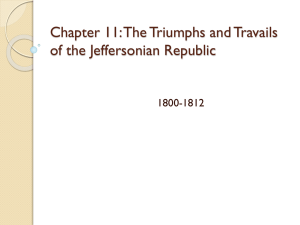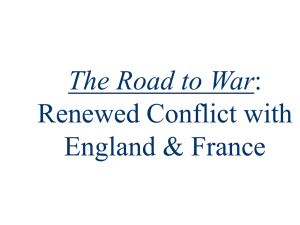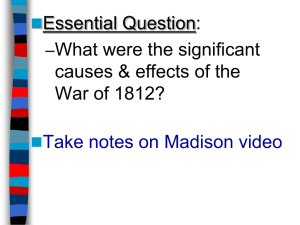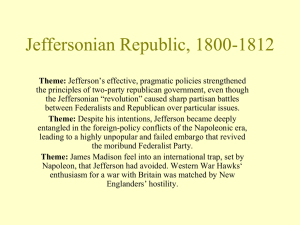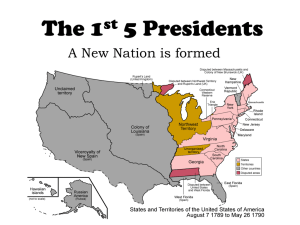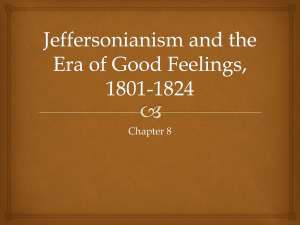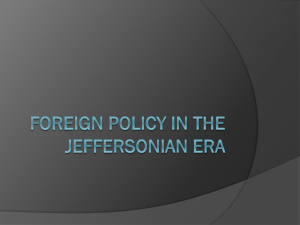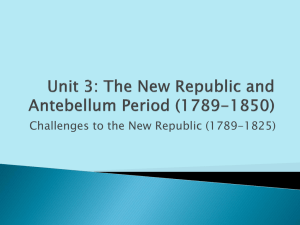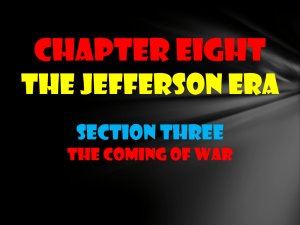The Hated Embargo - Coweta County Schools
advertisement
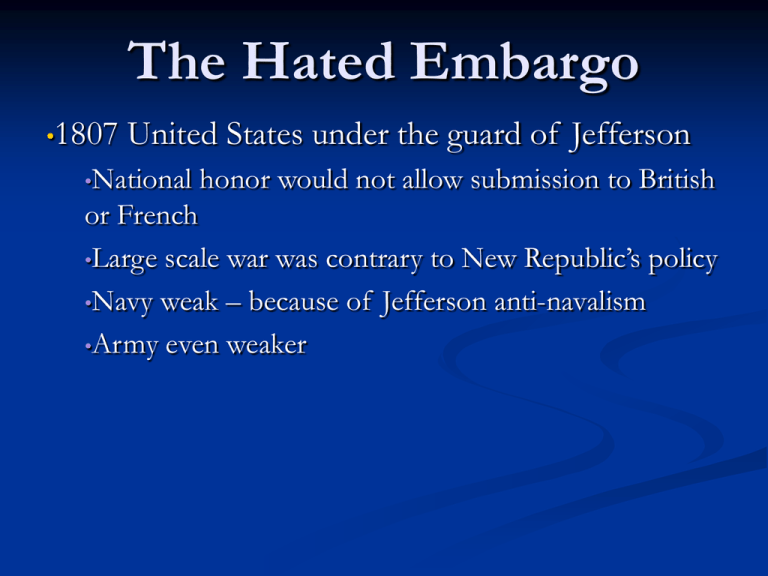
The Hated Embargo •1807 United States under the guard of Jefferson •National honor would not allow submission to British or French •Large scale war was contrary to New Republic’s policy •Navy weak – because of Jefferson anti-navalism •Army even weaker The Hated Embargo Warring European nations depended on U.S. for raw materials and foodstuffs. Trying to avoid war Jefferson latched upon this essential fact. If America cut off its exports, Europe would be forced to respect its rights. Responding to the Pres. Congress hastily passed the Embargo Act in late 1807. The Hated Embargo Embargo Act 1807 Forbade the export of all goods from the U.S. whether in U.S. or foreign ships. Embodied Jefferson’s policy of “peaceful coercion” If embargo worked – it would vindicate the rights of neutral nations and point to a new way of conducting foreign affairs. If failed – the Republic might perish, subjugated to the European powers or sucked into their ferocious war, according to Jefferson. The Hated Embargo The U.S. suffered under the embargo long before Britain or France began to bend. Harbors were filled with dead masts Docks were deserted (except for illegal trade) Soup kitchens cared for some of the hungry unemployed Jefferson was hurting the New England commerce that he vowed he was trying to protect. The Hated Embargo Farmers in the South and West (strongholds of Jefferson) suffered no less. Mounting piles of unexportable cotton, grain, and tobacco Jefferson seemed to be waging war on his fellow citizens The Hated Embargo Illicit trade mushroomed in 1808, especially along the Canadian boarder. Armed Americans on loaded rafts overpowered federal agents Transposed “Embargo” “O Grab Me”, “Go Bar’ Em,” and “Mobarge,” and cursing the “Dambargo” The Hated Embargo Jefferson had Congress pass iron-toothed legislation to enforce the Embargo Inquisitorial and tyrannical The embargo helped to revive the almost dead Federalist party. Federalist party leaders hurled their nullification of the embargo to the “Virginia lordlings” in Washington. The Hated Embargo In 1804 Federalist received 14 electoral votes out of 176 In 1808, the embargo year, they received 47 out of 175. New England talked of secession Jefferson later admitted that he felt the foundations of the nation tremble under his feet. The Hated Embargo Yielding to public anger, Congress repealed the embargo on March 1, 1809, three days before Jefferson retirement. Non-intercourse Act – formally reopened trade with all the nations of the world, except Britain and France. Watered down economic coercion continued to be the policy until the nation finally plunged into war. The Hated Embargo Why did Jefferson’s Embargo Act collapse after fifteen dismal months? He underestimated the determination of the British Overestimated the dependence of both belligerents on America’s trade Bumper grain crops blessed the British Isles during these years Revolutionary Latin American republics opened for compensating commerce. The Hated Embargo Why did Jefferson’s Embargo Act collapse after fifteen dismal months? With most of Europe under his control Napoleon could afford to go without American trade. The French continued to seize American ships and steal their cargoes, The embargo was not continued long enough to be effective. But a leaky embargo was perhaps more costly than none at all. The Hated Embargo New Prosperity from Embargo Old factories and new ones were built in New England during the Embargo. The real foundations of modern America’s industrial might were laid behind the protective wall of the Embargo, the Non-intercourse Act and the War of 1812. Madison’s Gamble Jefferson followed Washington’s lead and left office after two terms. Escape the “splendid misery” Favored nomination of his successor and friend, James Madison Madison took the oath of office, March 4, 1809 The conflict in Europe was drawing to its climax Crippled as pres. by factions w/in his party and cabinet. Madison’s Gamble Madison unable to dominate Congress Often found himself holding the bag for risky foreign policies not of his own making. Non-Intercourse Act of 1809 was due to expire in 1810. To Madison dismay Congress dismantled the embargo completely w/Macon’s Bill No. 2. (an attractive lure) It opened trade w/the world If either Britain of France repealed its commercial restrictions, America would restore its embargo against the non repealing nation. Madison’s Gamble Madison unable to dominate Congress Macon’s Bill No. 2 con’t. Madison believed that the bill was a shameful capitulation. It practically admitted that the U.S. could not survive w/out one of the belligerents as a commercial ally, But it left determination of who that ally would be up to the leaders of London and Paris. Madison’s Gamble Napoleon see an unusual opportunity Since 1806 Britain had justified its Orders in Council as retaliation for Napoleon’s actions (implying that trade restrictions would be lifted if the French decrees disappeared.) Now the French held out the same half promise. August 1810, Napoleon’s foreign minister stated that decrees might be repealed if Britain also lifter its Orders in Council. (Message was deliberately ambiguous) Had no intention of permitting unrestricted trade between U.S. and Britain Hoped to maneuver the U.S. into resuming its embargo against the British (creating a partial blockade that he would not have to enforce) Madison’s Gamble Madison’s Gamble Madison knew better than to trust Napoleon Gambled that the threat of seeing the U.S. trade exclusively w/France would lead the British to repeal their restrictions and vice versa. Accepted emperor’s offer as evidence of repeal Macon’s Bill gave British 3 months to live up to their implied promise of Revoking the Or. In Coun. And reopening the Atlantic to neutral trade. Madison’s Gamble Madison’s Gamble British reply British were in firm control of the seas, and saw little reason to bargain. As long as there was a war w/France, the U.S. could trade only w/ Great Britain. Gamble failed President Madison saw no choice but to reestablish the embargo against Britain alone. Madison knew this meant the end of American neutrality And possibly the first step toward war
